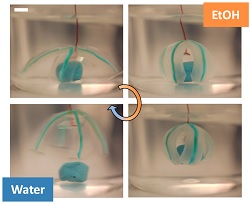 |
| A demonstration of a "soft robotic" arm in water and ethanol--Courtesy of NC State |
In a recent study, researchers demonstrated the potential of "soft robotics"--a combination of biocompatible hydrogels and electronics--to create tools that can "grab" molecules and manipulate them for drug delivery purposes.
The North Carolina State University researchers used water-based hydrogels along with polymer molecules and conducted electricity through them using a copper electrode, according to the university. When injected with a positive charge, the material stiffens and becomes resilient in water, creating a framework that can be stable for months.
The team of scientists used arms made of these hydrogels to demonstrate the uses of the material, injecting copper ions into a sort of claw that could close around an object and grab it tightly when flexed and then release it when the ions were sent elsewhere. They also showed how the material could close when immersed in ethanol and open again in water. The larger demonstrations exhibit characteristics the material has at a microscopic level, which would make it useful for drug delivery.
"This work brings us one step closer to developing new soft robotics technologies that mimic biological systems and can work in aqueous environments," said co-author Michael Dickey in a statement.
"In the nearer term, the technique may have applications for drug delivery or tissue scaffolding and directing cell growth in three dimensions, for example," said Orlin Velev, another senior author. "We are currently planning to use this technique to develop motile, biologically compatible microdevices."
- here's the NC State report